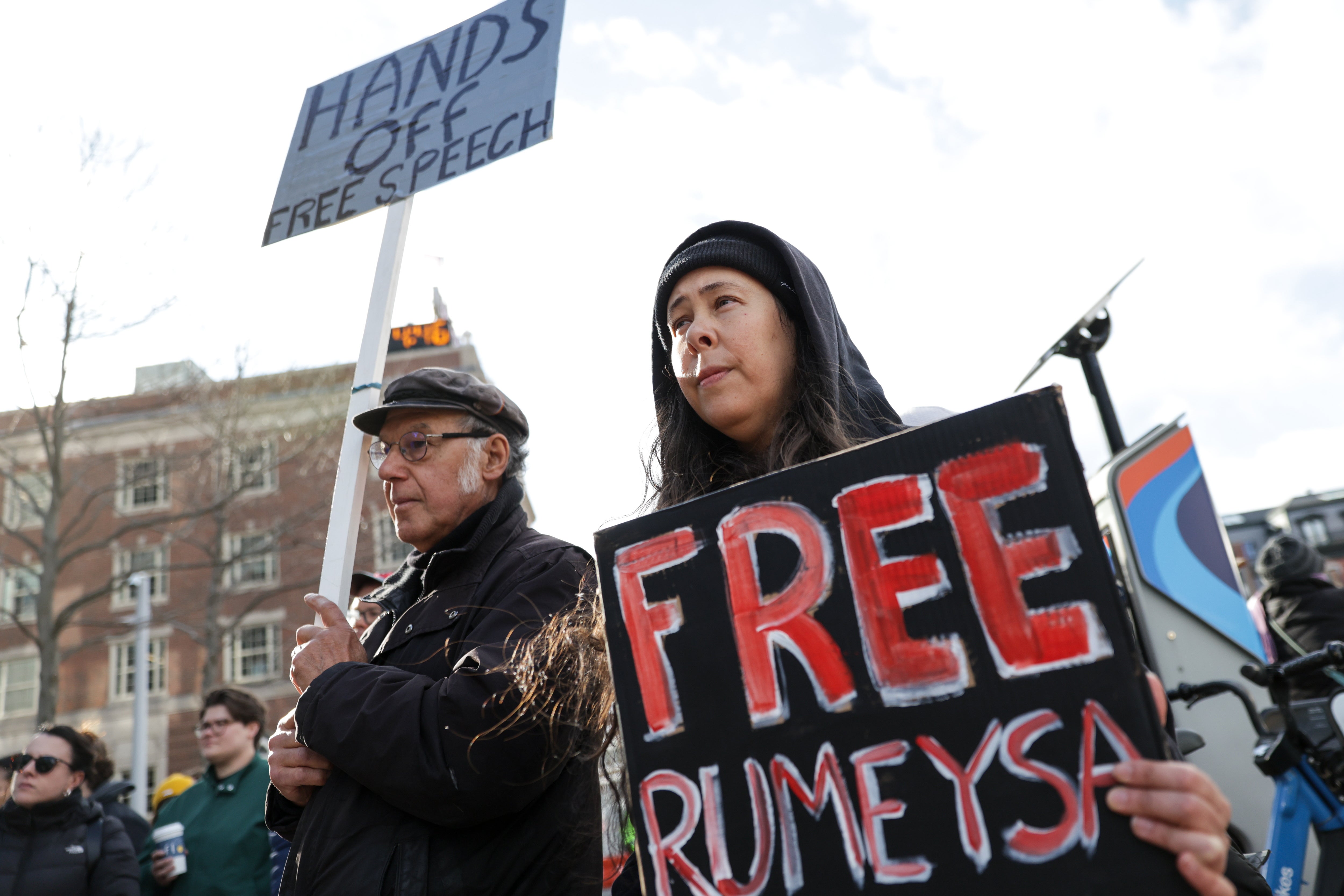Tufts University doctoral student Rumeysa Ozturk experienced an asthma attack while federal agents were moving her from Massachusetts to a detention facility in Louisiana, according to her attorneys.
Mask-wearing plain-clothes agents grabbed Ozturk off the street near her apartment in Somerville on March 25, sending shockwaves through the university community, student activists and civil rights groups as Donald Trump’s administration targets international students who spoke out in support of Palestine.
Ozturk’s attorneys, friends and the Turkish consulate could not find her until nearly 24 hours after she was arrested, according to attorney Mahsa Khanbabai.

After her arrest, a representative from the Turkish consulate “went personally” to an Immigration and Customs Enforcement office and was told that ICE “could not provide further information about her whereabouts,” according to Ozturk’s attorneys.
“Department of Justice counsel on this matter also informed counsel for Rumeysa that they could not locate her,” they wrote.
A federal judge in Massachusetts had blocked her removal from the state without a court order, but agents had already sent her to Louisiana, more than 1,000 miles away, to a facility that processes immigrants for removal from the country.
Ozturk’s attorneys were finally able to speak to her “late in the evening” on March 26, when they learned she had an asthma attack while en route to Louisiana.
Her ordeal is “shocking, cruel, and unconstitutional,” Khanbabai said Friday.
Ozturk’s arrest and detention “are designed to punish her speech and chill the speech of others,” her attorneys wrote in court filings on Friday demanding her release.
“Indeed, her arrest and detention are part of a concerted and systemic effort by Trump administration officials to punish students and others identified with pro-Palestine activism,” they added.
Ozturk — a Fulbright scholar working towards a PhD in child study and human development from Tufts after receiving a master’s degree from Columbia University — has not been charged with any crime. The Trump administration has revoked her visa, and the Department of Homeland Security has accused her of engaging “in activities in support of Hamas.”
But administration officials appear to admit she was solely targeted for what her attorneys say is constitutionally protected speech.
Last year, in response to Israel’s ongoing devastation of Gaza, Ozturk co-authored an op-ed with four other students in The Tufts Daily newspaper calling on the university to divest from companies with direct or indirect ties to Israel in an effort to hold Israel accountable “for clear violations of international law.”
“Credible accusations against Israel include accounts of deliberate starvation and indiscriminate slaughter of Palestinian civilians and plausible genocide,” the op-ed says.
Asked about her arrest and the allegations against her, Secretary of State Marco Rubio told reporters “we revoked her visa.”
“We gave you a visa to come and study and get a degree, not to become a social activist that tears up our university campuses,” he said during a press conference Thursday.

Ozturk’s attorneys argue the administration is violating her First Amendment rights and her Fifth Amendment right to due process.
“Rumeysa’s arrest and detention are not a necessary or usual consequence of the revocation of a visa,” attorneys wrote. “But like the revocation of her visa, her arrest and detention are designed to silence her, punish her for her speech, and ensure that other students will be chilled from expressing pro-Palestinian viewpoints.”
No person, regardless of their immigration status, “can be arrested, detained, or deported as punishment for their political views,” according to Carol Rose, executive director of the ACLU of Massachusetts. “Ideas – and certainly op-eds – are not illegal. The First Amendment protects all of us.”
Ozturk’s arrest follows a series of similar incidents targeting international students for speaking out against Israel’s war in Gaza, which sparked demonstrations at college campuses across the country.
Trump’s anti-immigration agenda is dovetailing with his administration’s efforts to suppress protests against Israel’s war in Gaza at prestigious universities, which administration officials have accused of harboring antisemitic “pro-Hamas” activities.
Several doctoral candidates and graduate students — including lawful permanent residents — have been arrested and threatened with removal from the country within the last month.
Mahmoud Khalil, a green card holder who is expected to graduate from Columbia’s master’s program in May, is currently detained in Louisiana after his arrest in front of his pregnant wife, a U.S. citizen, earlier this month.
Homeland Security spokesperson Tricia McLaughlin said Ozturk and Khalil are detained under a provision of the Immigration and Nationality Act, which states that the secretary of state can deport any noncitizen whose presence in the United States is considered a threat to the nation’s foreign policy interests.
Administration officials have accused Khalil of “antisemitic activities” and supporting Hamas, which he has denied. Officials concede he has not committed any crime, but claim he can be removed over what they characterize as “potentially serious adverse foreign policy consequences.”
A federal judge has agreed to move Khalil’s case to New Jersey, where another judge is weighing whether to grant his release while his legal challenge plays out.
Vance says no military action needed in Greenland: Live updates
Trump’s newest law firm target is where FBI foe Robert Mueller once worked
Trump wants to ramp up US mineral production. Could the Grand Canyon be a target?
The real reason Trump had to rescind Elise Stefanik’s UN nomination
Trump admin offers Voice of America employees buyouts as judge looks to spare network
Trump moves to officially close USAID, tells employees their jobs will be eliminated







